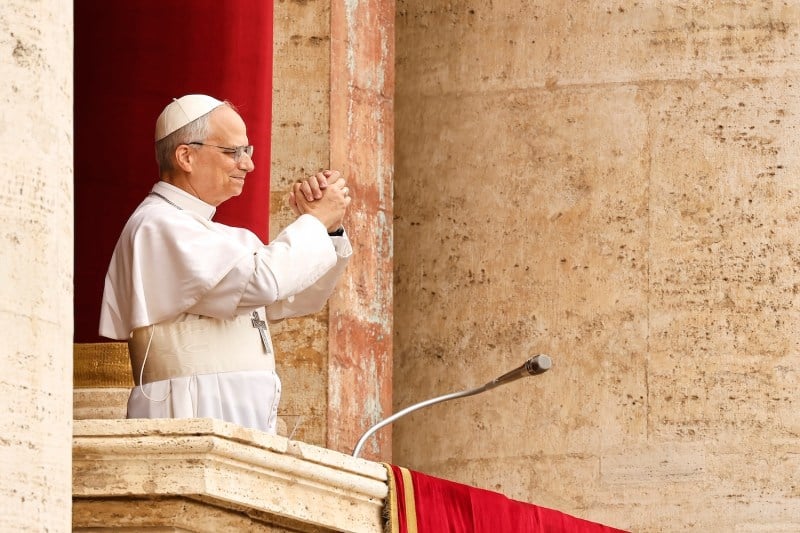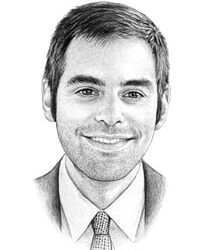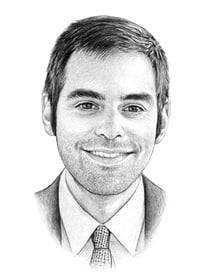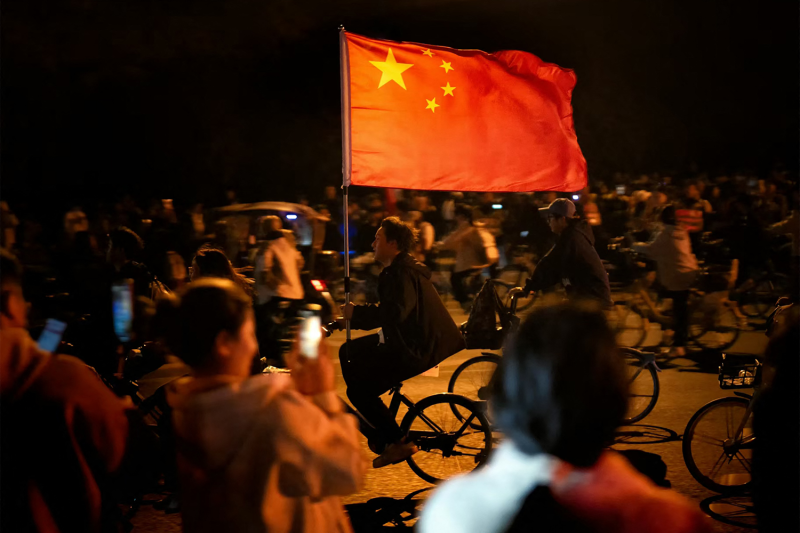The Meaning of the First Augustinian Pope

The Meaning of the First Augustinian Pope
Pope Leo’s politics will be shaped less by his American nationality than his tradition of Catholic thought.
Pope Leo XIV delivers the Regina Caeli prayer from the main central loggia of St Peter’s basilica oon May 11, 2025 in Vatican City. Mario Tama/Getty Images
While the world is abuzz about the political prospects of the first American-born head of the Vatican, far more consequential may be that Leo XIV is also the first Augustinian pope. While not predictive, a better understanding of the Augustinian tradition provides greater insights into the potential direction that the new pontiff may lead the church and its 1.5 billion Catholics globally, as well as opportunities for domestic political activism at home.
The armchair opining about whether the new pope is politically conservative or liberal—while understandable—belies the difficulties of cramming faith-based motivations into a left-right spectrum of secular political ideologies. For championing the dignity of the poor and marginalized, his predecessor Pope Francis was lambasted as “woke” by the U.S. right, while heading a patriarchal church that subordinates women and decries abortion as murder invited scorn from the political left.
While the world is abuzz about the political prospects of the first American-born head of the Vatican, far more consequential may be that Leo XIV is also the first Augustinian pope. While not predictive, a better understanding of the Augustinian tradition provides greater insights into the potential direction that the new pontiff may lead the church and its 1.5 billion Catholics globally, as well as opportunities for domestic political activism at home.
The armchair opining about whether the new pope is politically conservative or liberal—while understandable—belies the difficulties of cramming faith-based motivations into a left-right spectrum of secular political ideologies. For championing the dignity of the poor and marginalized, his predecessor Pope Francis was lambasted as “woke” by the U.S. right, while heading a patriarchal church that subordinates women and decries abortion as murder invited scorn from the political left.
Such baseline tenets of Catholicism were unlikely to change regardless of who was chosen as pope. Within those broad political constraints, however, there is surprising latitude for maneuver. Leo’s position as a member of the Order of St. Augustine opens some interesting possibilities to inspire a broad-based, populist social movement that transcends denominational—and even religious—differences.
A young Robert Prevost joined the Augustinians in 1977, the same year he graduated with a mathematics degree from Villanova University, the “citadel of Augustinian education” that forged his Catholic identity. Following the conclave, the Rev. Peter Donohue, Leo’s friend and the current president of Villanova, appeared on the Today Show to explain how unusual it was for a member of one of the Catholic religious orders—the Franciscans, Dominicans, Jesuits, and the lesser-known Augustinians—to become pope. “Francis was a Jesuit, but most of the popes have been what we refer to as diocesan priests … who have risen up the ranks in a diocese,” Donohue said, cloaked in the Augustinians’ black robes of poverty.
“So for a ‘religious’ to get elected, it is a little unusual because the focus is on community life and the focus is really on how we live our lives. As an Augustinian, our emphasis is—our charism is—building community. So I think it will be really important to him to bring that charism to what he does. He’s been very engaged in the charism of building community. So it will be an interesting ride, I’m sure,” he added.
Before becoming pope, Prevost spoke openly about his Augustinian motivations. Unsurprisingly, Leo’s papal motto and coat of arms expressly evoke those traditions. But what do Augustinians believe? And how might that translate to inspiration—if not leadership—in the political realm?
As a longtime political science professor at Villanova, I could give you the boilerplate explanation that Augustinians are inspired by the works of the fifth-century North African bishop St. Augustine of Hippo, whose Confessions and The City of God loom large in the theological development of modern Christianity; that the university’s motto is Veritas, Unitas, Caritas (“Truth, Unity, Love”); or that it seeks to provide a nondogmatic, welcoming, and friendly community of learning and humility, combining faith with reason and critical thinking.
Indeed, when Leo first spoke to the throngs in St. Peter’s Square about an open, forward-looking community of peace and charity, he may well have been thinking of Villanova. While far from perfect, the Augustinian community here is easygoing and informal, where even the brothers at the on-campus friary prefer to be addressed by their first names. (This is why old friends and colleagues who knew Leo before his appointment as cardinal refer to him as “Father Bob.”) For students and faculty, there are no purity tests—religious, political, or otherwise—for acceptance and inclusion.
The university calendar is punctuated by the St. Thomas of Villanova and Martin Luther King Jr. days of service to poor and marginalized communities, but the biggest (non-basketball) event on campus is the Villanova Special Olympics Fall Festival, the largest student-run Special Olympics event in the world, welcoming more than 1,000 athletes.
This should come as no surprise, as Augustine was among the earliest Christian theologians to meaningfully explore issues of human diversity and disability, celebrating all parts of humanity that contribute to the beauty of the whole. Published in A.D. 426, Augustine’s The City of God explores the diversity of races and ethnicities but also those with intellectual and physical differences, including transgender and intersex individuals. Here, too, Augustine celebrates the diversity of human existence as equal reflections of the beauty of God’s creation:
But whoever is anywhere born a man, that is, a rational, mortal animal, no matter what unusual appearance he presents in color, movement, sound, nor how peculiar he is in some power, part, or quality of his nature, no Christian can doubt that he springs from that one protoplast [Adam]. … For God, the Creator of all, knows where and when each thing ought to be, or to have been created, because He sees the similarities and diversities which can contribute to the beauty of the whole.
Consequently, among Catholic orders, Augustinians tend to be at the forefront of diversity, equity, and inclusion efforts. If anything, building such a community has always been the charism of the Augustinian order. So, while Leo’s position appears uncertain, LGBTQ+ Catholics range from “cautiously optimistic” to a hailing him as “great choice,” citing his vocal promotion of an inclusive synodal church, more open to the lay community.
Such communitas was evident in Leo’s recent message to Villanova graduates, that “peace begins with each one of us—in the way we look at others, listen to others, and speak about others.” He urged graduates not to succumb to the “war of words and images,” the othering that stokes divisiveness and hatred. For Augustinians, discrimination and exclusion based on race, national origin, gender orientation, or ability run afoul not only of biblical precepts of love and charity but of the glorious mosaic that is God’s human creation. And it is this fundamental equality of God’s creations that undergirds Augustinian beliefs in liberty and the universality of human rights as essential to promoting a more just and peaceful society that furthers human dignity.
Leo and his Augustinian traditions have appeared on the global stage at a significant juncture in world history, amid the ongoing erosion of democratic values and governance worldwide, including in the United States. As such, Leo’s Augustinianism may provide an antidote to the self-interested, closed-door, closed-heart, and closed-minded politics of U.S. President Donald Trump’s new Gilded Age.
In many ways, Leo is the anti-Trump. Trump admits that he is motivated by wealth and self-aggrandizement; Leo embraces serving others, humility, and spurning materialism, right down to the Augustinians’ black robes. Trump’s list of personal sins and amoral transgressions is as extensive as it is well known; perhaps Leo’s Augustinianism will appeal to religious conservatives uncomfortable with defending Trump’s morally indefensible actions. Augustinian thought imparts a moral resolve in speaking out against unjust racism, xenophobia, misogyny, homophobia, and the social hierarchies that posit particular groups as inherently superior or inferior to others.
Progressive politics in the United States and elsewhere would do well to draw lessons from Leo’s Augustinian morality. More importantly, the Augustinian notion of a broad, inclusive, and diverse communitas of activists—working together for the common good—could inspire ever greater trust among Americans in one another and in their shared institutions, acting as a bulwark against the hatred, fear, and cynicism of the country’s present divided politics. Love, equality, justice, and trust: These are the foundations not only of the Augustinian community but of any community dedicated to the thriving and well-being of everyone in it.
Consequently, the biggest political opportunities with the election of a new pope may ultimately stem not from the fact that Leo is the first American pope, but that he is the first Augustinian pope.
Mark Lawrence Schrad is a professor of political science and the director of Russian area studies at Villanova University. He is author of Vodka Politics: Alcohol, Autocracy, and the Secret History of the Russian State and Smashing the Liquor Machine: A Global History of Prohibition X: @VodkaPolitics
More from Foreign Policy
-

This handout picture provided by the office of Iranian Supreme Leader Ayatollah Ali Khamenei shows him praying inside the tomb of the late Supreme Leader Ayatollah Ruhollah Khomeini in Tehran on Jan. 30. Why Khamenei Is Betting on Trump
The calculus behind Iran’s stunning reversal on a new nuclear deal.
-

Musk wears a red had that reads “GULF OF AMERICA.” Elon Musk Was Donald Trump’s Useful Idiot
It’s looking increasingly likely that the world’s richest man got played.
-

With Jared Kushner to his left, Donald Trump listens to the rabbi Shmuel Rabinovitch during a visit to the Western Wall in Jerusalem’s Old City on May 22, 2017. Trump Isn’t Following the Script on Israel
In dealing with Netanyahu, the U.S. president appears to actually be living up to his campaign slogan to put America first.
-

Indian Air Force personnel stand in front of a Rafale fighter jet during a military aviation exhibition at the Yelahanka Air Force Station in Bengaluru. A Tale of Four Fighter Jets
The aircraft India and Pakistan use to strike each other tell a story of key geopolitical shifts.









Join the Conversation
Commenting on this and other recent articles is just one benefit of a Foreign Policy subscription.
Already a subscriber?
.
Subscribe
Subscribe
View Comments
Join the Conversation
Join the conversation on this and other recent Foreign Policy articles when you subscribe now.
Subscribe
Subscribe
Not your account?
View Comments
Join the Conversation
Please follow our comment guidelines, stay on topic, and be civil, courteous, and respectful of others’ beliefs.
Change your username |
Log out
Change your username:
CANCEL
Confirm your username to get started.
The default username below has been generated using the first name and last initial on your FP subscriber account. Usernames may be updated at any time and must not contain inappropriate or offensive language.